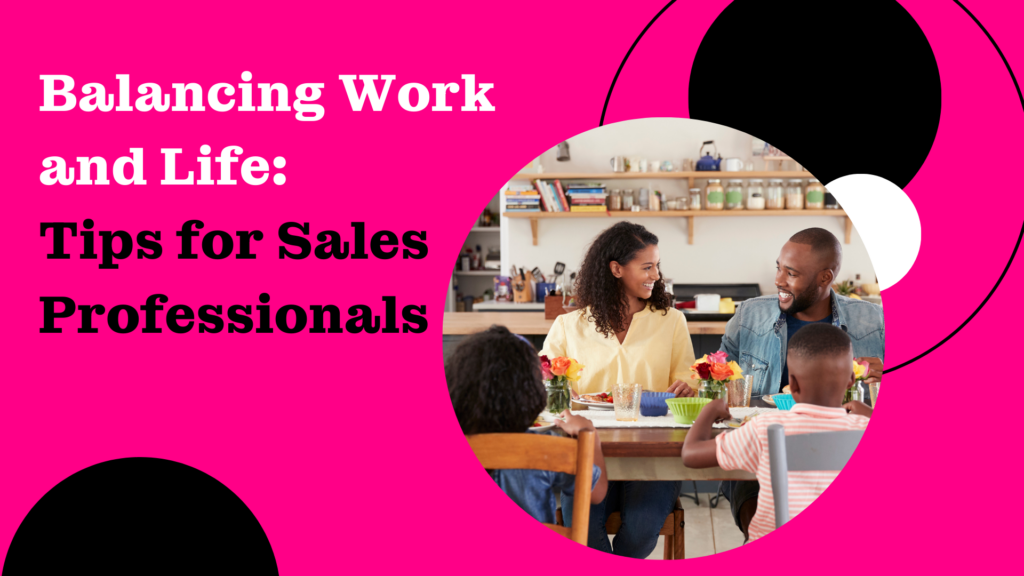Strategic Self-Advocacy: Empowering Your Sales Career

In sales, numbers speak, but so should you. For women of color in the industry, self-advocacy is not a luxury. It is a leadership skill. It is how you make your value visible, ensure your contributions are recognized, and claim the opportunities you have earned. Too often, we are told to let our work speak for itself. But in environments where visibility is uneven and biases exist, staying silent can mean staying overlooked. Self-advocacy is not about ego. It is about equity. It is the difference between waiting to be chosen and choosing yourself. Between hoping someone notices your impact and making sure they do. The good news? You can self-advocate in a way that feels strategic, authentic, and aligned with your values. Shift Your Mindset: Self-Advocacy Is a Skill, Not a Personality Trait You do not have to be the loudest person in the room to be effective at self-advocacy. You do have to be clear on your worth and intentional about how you communicate it. Start by reframing the idea that advocating for yourself is bragging. It is not. It is data. It is storytelling. It is leadership. Ask yourself: What impact have I had this quarter? What relationships have I built or strengthened? Where have I gone above expectations? Document these wins regularly. Your success deserves receipts, and receipts build confidence. Be Clear on Your Value Proposition Just like your product pitch, your career pitch should clearly articulate your unique value. What do you bring to the table that drives results? What problems do you solve? What is your unique strength? Build a “self-advocacy script” rooted in outcomes: “Last quarter, I exceeded my quota by 28 percent by expanding into a new client segment.” “I created a new onboarding deck that helped ramp up new reps two weeks faster.” “My ability to build trust with cross-functional teams helped move a stalled deal to close.” These are not just statements, they are proof points. They show how you lead, contribute, and grow impact. Speak Up in the Right Rooms It is not enough to be excellent. You need to be visible. Start looking at every meeting, one-on-one, and performance review as an opportunity to reinforce your impact. Share updates with clarity. Offer insights when appropriate. Ask for feedback and share your own goals. Promote yourself constructively. Do not wait until review season to talk about your wins. Build the habit of regularly sharing progress with your manager or team. Use emails, one-pagers, or quick check-ins to show alignment and impact. And do not be afraid to ask for what you want. That promotion, that raise, that leadership opportunity is not out of reach, but it may require you to claim it first. Build Internal Advocates, Not Just Mentors Mentorship is powerful. Sponsorship is game-changing. A mentor offers advice. A sponsor uses their influence to open doors for you. To advocate for yourself strategically, build relationships with people who understand your work and are in rooms you are not yet in. Keep them looped in on your progress. Ask for guidance and visibility. Offer support in return. Your network inside your company is part of your brand. Curate it with care. Use Your Voice to Lead, Not Just to Defend Self-advocacy is not just about protecting your performance. It is about leading from where you are. That means speaking up when you see gaps in strategy. Sharing ideas to improve systems. Advocating for other women of color. Asking tough questions when inclusion is missing. When you lead with confidence and clarity, you build credibility and you make space for others to rise too. Your Impact Deserves to Be Seen You have already done the work. You have put in the hours. You have delivered the results. Now it is time to make sure the right people know what you bring to the table. Self-advocacy is how you take control of your career path. It is how you turn quiet excellence into recognized leadership. And you do not have to do it alone. At Sistas in Sales, we create spaces for women of color to speak boldly about their value, build strategic influence, and grow their careers with power and purpose. Whether you are aiming for a promotion, managing up, or preparing to negotiate your worth, this community is here to sharpen your voice and support your rise. Join us at the Sistas in Sales Summit 2025 to deepen your leadership, expand your network, and master the art of strategic self-advocacy. You have earned your seat at the table. Now let’s make it count.
How Transferable Skills from Diverse Backgrounds Lead to Sales Success

Success in sales doesn’t come from following one set path, it comes from leveraging the full range of experiences that shape who you are. For women of color especially, entering or growing within the sales world often means bringing a rich, diverse background—one that includes leadership in other industries, entrepreneurial grit, community-building skills, advocacy, creativity, and resilience forged in spaces where we had to lead without formal titles. And here’s the truth: those experiences aren’t detours. They’re your competitive edge. Today’s buyers don’t just want polished pitches—they want authenticity, perspective, and people who understand real needs in a complex world. Your lived experiences are the differentiator that can open doors, close deals, and build trust faster than any textbook technique. Why Diverse Career Paths Create Stronger Sellers Sales isn’t just about product knowledge or polished scripts. It’s about relationships, trust, problem-solving, and adaptability. If you’re coming into sales from a different field, whether it’s education, healthcare, retail, marketing, nonprofit leadership, or the arts, you’re already bringing skills many traditional reps have to work hard to develop: Relationship-Building Teachers know how to read the room. Healthcare workers know how to navigate urgency and trust. Community organizers know how to align stakeholders. Every one of these skills maps directly to high-impact selling. Problem-Solving Under Pressure If you’ve managed projects, mediated teams, handled crises, or built strategies from scratch, you already know how to stay calm, solution-oriented, and focused when challenges arise. Storytelling and Influence Artists, marketers, writers, and activists understand the power of a story well told. In modern sales, being able to frame a solution within a compelling narrative is everything. Resilience and Emotional Intelligence If you’ve ever had to advocate for yourself or others in difficult spaces, you have resilience baked into your DNA, and emotional intelligence that buyers today crave in a sales partnership How Diverse Experience Builds Strategic Advantage Your previous roles did more than fill your résumé. They sharpened the exact skills that top sellers rely on every day. When you’ve worked across different industries or functions, you’re not just carrying knowledge. You’re carrying strategy, nuance, and the ability to see patterns others might miss. Diverse experience doesn’t just make you relatable. It makes you resourceful. Here’s what that looks like in sales: You anticipate needs sooner Coming from fast-paced or high-empathy roles like healthcare, education, or nonprofit leadership means you’ve had to make decisions with limited information. That intuition helps you identify buyer pain points early and ask smarter discovery questions. You solve creatively, not just quickly If your background includes problem-solving in complex systems like navigating red tape in public institutions or building community initiatives on limited budgets, you bring innovation that isn’t bound by how it’s always been done. You connect more authentically Sales isn’t just about what you pitch. It’s about how you listen. Diverse professional journeys teach you to meet people where they are. That’s what builds trust and long-term partnerships. You adapt faster under pressure If you’ve ever pivoted careers, managed competing responsibilities, or operated without a roadmap, then resilience and adaptability are already part of your toolkit. That gives you an edge when deals stall, markets shift, or strategies change. Your past roles weren’t detours. They were development. The range you’ve built across industries, teams, and challenges is what makes you not just a seller but a standout. How to Position Your Past as a Power Move If you’re coming from another industry (or a non-traditional path), own it boldly. Here’s how: Tell the story in outcomes. When you talk about your background, focus on transferable wins. “In my previous role, I led X initiative, which increased retention by 20%.” or “I managed a caseload of 150 clients while maintaining a 98% satisfaction rate.” Connect skills to sales outcomes. Draw the line clearly: “My experience in education honed my ability to build trust quickly and communicate complex ideas clearly. These are skills I now use daily in enterprise sales conversations.” Frame it as an advantage, not an apology. Your diverse journey gives you range, grit, and insight that can’t be manufactured. Make sure buyers and hiring managers see it as a value add, not a gap. Your Journey is Your Advantage There is no single “perfect” path into sales. Success isn’t about fitting a mold; it’s about bringing more voices, experiences, and perspectives to the table, especially in a world as complex as the one we’re selling into. You are not starting behind. You are starting with strengths others are still working to build. Your resilience, adaptability, and lived experience don’t just make you qualified…they make you an asset. They allow you to see opportunities others miss, build trust more deeply, and solve problems in ways that feel real and human. Your path has prepared you for this moment. It’s not something to overcome. It’s the reason you’re ready. Your resilience, your range, your lived expertise make you not just a good rep but a transformational one. Ready to Take It Further? At Sistas in Sales, we believe your story is your superpower. Whether you’re pivoting into sales for the first time, scaling to leadership, or bringing decades of cross-industry experience into a new role, you deserve to be in spaces where your background is seen as a strength—not a question mark. Join the Sistas in Sales community to access mentorship, leadership development, skills training, and a network of women who know the power of bringing every part of their journey to the table. And don’t miss the upcoming SIS Summit. It’s the premier gathering where women of color in sales come together to build skills, celebrate wins, and expand their careers on their own terms. Expect bold conversations, actionable workshops, leadership pathways, and a community that sees your full potential. Own your path. Own your power. Build your legacy. See you at Summit 2025.
Thriving in Sales Without Burning Out: A Guide for Women of Color to Protect Their Peace and Perform With Purpose

Success in sales often comes with pressure. Pressure to hit goals, outperform expectations, and show up with energy and confidence day after day. But for women of color in sales, that pressure is layered. We navigate high expectations while being underrepresented, manage the emotional weight of being “the only,” and balance caregiving, community, and career, all while staying “on.” Let’s be real. That kind of pressure can be exhausting. And in a world that celebrates hustle culture, it can be hard to admit when we’re running on fumes. But here’s the shift: You don’t have to sacrifice your well-being to succeed in sales. You can perform at a high level without burning out. You can protect your energy while growing your impact. This isn’t about finding perfect balance. It’s about building your version of a sustainable, aligned sales career. What Balance Really Looks Like (and What It Doesn’t) The traditional idea of work-life balance implies clean lines: work on one side, life on the other. But for most of us—especially women of color—life isn’t split down the middle. It overlaps. It blends. It moves in seasons. Some weeks, you’re in back-to-back demos and negotiating deals at a high pace. Other weeks, family, health, or mental recovery take center stage. Balance isn’t about rigid routines. It’s about flexibility and self-awareness. Real balance means giving yourself permission to shift, adjust, and reset when you need to. It means designing your days in a way that supports both your goals and your peace. Managing Stress in a High-Pressure Sales Role Stress is part of the job, but it shouldn’t run the show. In high-performance environments, stress can feel like a constant companion. And if you’re a woman of color, that stress is often compounded by microaggressions, bias, or pressure to prove yourself twice over. Burnout doesn’t happen all at once. It builds slowly. And the first step to avoiding it is recognizing what’s draining you. Start here: Name your stressors. Are you overcommitted? Is performance anxiety creeping in? Are you holding emotional labor that no one sees? Create boundaries that stick. Use calendar blocks for focused work. Turn off notifications after hours. Communicate your availability clearly and confidently. Build recovery into your routine. Take walks between calls. Use music or breathwork to reset. Log off early once a week when you can. Rest isn’t earned. It’s essential. Check in with yourself. Ask: How am I feeling today? What do I need more or less of? That awareness keeps you from hitting empty without realizing it. You are your most valuable asset. Protecting your energy isn’t optional. It’s leadership. Create Boundaries That Actually Work In a remote or hybrid sales environment, your home and your job can start to feel like the same space. One more Slack message. One more CRM update. One more late-night follow-up. Suddenly, there’s no clear “off” switch. Reclaim your time and space by setting boundaries that support your focus and protect your peace: Designate a workspace. Even if it’s just a corner of the table, make it clear where work begins and ends. Start and end your day with intention. Use simple rituals like writing down wins, lighting a candle, or closing your laptop mindfully to signal transition. Repurpose your old commute. Use that time for stretching, journaling, or movement instead of jumping straight into tasks. Stick to your hours. Let your team know when you’re offline. Model the boundaries you want respected. Boundaries aren’t about doing less. They’re about doing what matters more intentionally. Let Community Carry You You don’t have to figure it all out alone. In sales, especially in environments where you’re underrepresented, it’s easy to feel isolated. But thriving isn’t just about strategy. It’s about support. Being part of a community that understands your experience doesn’t just feel good. It’s a career advantage. When you can share honestly, ask questions, learn from others, and be affirmed, your confidence grows. And so does your performance. At Sistas in Sales, we believe success should be sustainable and collective. We talk about quotas, yes. But we also talk about boundaries. Burnout. Mindset. Power. Wellness. Rest. We celebrate wins, and we hold space for the tough days, too. Ready to Lead With Impact and Intention? You’re building something big, and you deserve to do it without sacrificing your peace to prove your worth. There is no perfect formula, only the practices and support systems that help you feel whole, focused, and in control. So ask yourself: What’s one shift I can make this week to protect my energy, reclaim my time, or reset my routine? Start there. And if you’re ready to build your career alongside a community that sees you fully, join us at Sistas in Sales. From wellness resources and leadership development to mentorship and sisterhood, we’re here to help you lead with clarity and succeed without burnout. Plus, don’t miss the 2025 Sistas in Sales Summit. This is the premier gathering for women of color in sales to connect, recharge, and rise. Expect bold conversations, real talk about balance and boundaries, and the kind of community that doesn’t just cheer you on but walks with you. Join the SIS community today, and we’ll see you at the Summit.
Overcoming Imposter Syndrome in Sales

Imposter syndrome is a silent struggle that many sales professionals face—particularly women of color navigating a high-pressure, performance-driven environment. You may be hitting your quotas, closing deals, and earning recognition, but still feel like you don’t belong or that your success is just a fluke. If this resonates, you’re not alone: research shows that up to 70% of professionals experience imposter syndrome at some point in their careers, regardless of skill level or achievements. Sales can feel like a very high-pressure world, where targets are high-stakes, rejection is frequent, and competition is fierce, which means that feelings like imposter syndrome can hit even harder. For women of color in sales—where representation in leadership remains disproportionately low—imposter syndrome can be compounded by external biases, microaggressions, and systemic challenges. The good news? These feelings are not a reflection of your abilities, and you can overcome them with intention, awareness, and a strong support system. Let’s break down how to identify imposter syndrome, understand why it thrives in sales, and adopt strategies to quiet self-doubt so you can show up as your most confident self. How to Identify Imposter Syndrome Imposter syndrome shows up in subtle but familiar ways: Feeling like you don’t “belong” in sales or at the table. Dismissing your successes as luck or timing instead of acknowledging your skill. Avoiding challenges out of fear of failure, or overworking to “prove” your worth. Feeling unqualified even when you’ve earned your role and results. For example, you might close a significant deal but tell yourself, “It was just luck” or “The client was easy.” Maybe you hesitate to speak up in meetings or struggle with comparing yourself to top performers, even when you’ve achieved success in your own right. If these thoughts sound familiar, remember: self-doubt doesn’t mean you’re incapable—it’s a signal to build your confidence from within. Why Imposter Syndrome Persists in Sales Sales is an industry where performance is measured constantly, which can amplify feelings of inadequacy: High Pressure: The pressure to hit quotas month after month can make even top performers doubt themselves. Constant Comparison: Seeing colleagues celebrate big wins or seeing names at the top of the leaderboard can fuel unfair comparisons. External Challenges: For women of color, the absence of mentors or representation in leadership can reinforce feelings of being an “outsider.” Rejection Culture: Sales comes with regular “no’s”—and without resilience, it’s easy to let rejection chip away at confidence. Add to this the reality that many professionals don’t openly discuss these struggles. However, research confirms that recognizing and addressing imposter syndrome head-on can have a tangible impact on performance and well-being source. Strategies to Overcome Imposter Syndrome in Sales Track and Celebrate Your Wins: Keep a record of your successes—no matter how big or small. Whether it’s a major deal closed, positive client feedback, or a milestone hit, write it down. A “wins journal” can remind you that your achievements are earned, not luck. Reframe Negative Thoughts: Challenge your inner critic and replace self-defeating thoughts with affirming ones: Instead of “I got lucky,” say, “I worked hard to close this deal.” Instead of “I don’t know enough,” remind yourself, “I’m learning, growing, and showing up every day.” Invest in Yourself: Confidence comes from preparation and growth. Seek out workshops, training sessions, and resources to sharpen your skills. By investing in yourself, you strengthen your sense of competence. Events like the Aspiring Sellers Summit provide tools, mentorship, and community to help you navigate your sales journey with confidence. Find Mentors and Community: Having mentors or a supportive community can make all the difference in overcoming imposter syndrome. Mentors provide guidance, affirmation, and real-world advice for navigating challenges. Communities like Sistas in Sales offer a safe space to connect, learn, and grow alongside peers who understand your experience. Progress Over Perfection: Sales is all about persistence and improvement—not perfection. Focus on progress and growth: Break big goals into smaller milestones. Celebrate every step, even if it’s incremental. The path to success is rarely linear, and no one expects you to be perfect. By showing up consistently, you’re building a foundation for long-term success. Building Confidence in Your Sales Role Confidence in sales isn’t just about “faking it till you make it.” It’s about: Trusting your skills and preparation. Embracing challenges as learning opportunities. Reminding yourself that you’ve earned your place, no matter how loudly self-doubt tries to speak. Representation matters, too. Seek out the stories of trailblazing women in sales who have paved the way. Let their journeys inspire you to recognize your own potential and remember: you are not alone. You Belong Here Imposter syndrome is a common hurdle, but it’s not an immovable barrier. By tracking your wins, challenging self-doubt, leaning on mentors, and committing to your growth, you’ll develop the confidence and resilience needed to thrive in sales. At Sistas in Sales, we’re committed to providing resources, events, and a supportive community to help you overcome challenges and achieve your goals. Join us in rewriting the narrative—because you do belong here, and your success is well-deserved. Ready to connect, learn, and grow with women who get it? Explore the tools and community waiting for you through SIS membership today.
Balancing Work and Life: Tips for Sales Professionals

Working in sales often feels like being on an endless treadmill—calls, emails, follow-ups, client meetings, and the constant pressure of hitting your numbers. It’s a career that rewards hustle, but without balance, that hustle can quickly turn into exhaustion. Finding work-life balance is not a luxury—it’s essential for long-term success, mental well-being, and career satisfaction. Set Clear Boundaries Between Work and Life The pressure to always be “on” can blur the line between your professional and personal life. Without boundaries, it’s easy to burn out or feel perpetually tethered to work. Start by setting defined work hours and sticking to them. If you’re done at 6 p.m., step away and let your clients and colleagues know you’ll pick things up the next day. Create physical and digital boundaries too—turn on “do not disturb” settings on your devices, close your email when you’re off the clock, and make sure your workspace is separate from your living area whenever possible. By consistently honoring these boundaries, you’ll show others (and yourself) that balance matters. Master Time Management to Work Smarter Sales professionals know that time is money, but managing it effectively is easier said than done. Use time-blocking strategies to organize your day into focused work segments—prospecting, client calls, follow-ups, and admin tasks—while building in time for breaks. It’s equally important to prioritize the tasks that drive the most results. Apply the 80/20 rule: 20% of your tasks will generate 80% of your impact. Focus on high-value activities that move you closer to your goals and delegate or automate tasks that don’t require your attention. Productivity tools like CRMs, calendars, and task management software can help streamline your efforts. Prioritize Self-Care to Boost Energy and Focus It’s a common misconception that pushing through fatigue shows dedication. In reality, neglecting your well-being hurts both your personal health and professional performance. Small acts of self-care throughout your day can make a huge difference. Take real breaks: step away from your screen, stretch, or take a walk. Prioritize getting enough sleep, staying hydrated, and incorporating exercise—even if it’s just a quick 10-minute routine. When you feel physically and mentally recharged, you show up sharper, more focused, and ready to win. Find Strength in Community Navigating the demands of a sales career is far easier when you’re surrounded by people who understand what you’re going through. Build connections with peers and mentors who can share advice, provide support, and offer fresh perspectives. Whether it’s brainstorming strategies, working through challenges, or celebrating wins, community makes a difference. Joining organizations like Sistas in Sales can provide invaluable access to resources, events, and a network of women of color who empower one another. In spaces like these, mentorship thrives, knowledge is shared, and professional relationships turn into lifelong bonds. Redefine Success Beyond the Numbers Success in sales often comes down to hitting targets and closing deals, but true success is about sustainability, growth, and personal well-being. Shift your mindset to celebrate progress instead of chasing perfection. Small wins—like building stronger client relationships, achieving personal goals, or learning new skills—are just as important as the numbers you hit. When you focus on steady, sustainable growth, you’ll reduce pressure, create healthier habits, and find more fulfillment in your work. Achieving Balance Makes You Better at What You Do Balancing work and life doesn’t have to mean working less—it means working more intentionally. When you prioritize your time, honor boundaries, and invest in your well-being, you’ll perform at your best. If you’re looking for additional tools to thrive in your career while maintaining balance, consider joining Sistas in Sales. As part of our community, you’ll gain access to mentorship opportunities, professional development events, and a network of women who support your growth. Together, we’re redefining what success looks like—one career at a time. Sales is a marathon, not a sprint. By striving for balance, you’ll ensure you have the energy, focus, and resilience to reach the finish line—and beyond.
The Importance of Emotional Intelligence in Sales

Emotional intelligence (EQ) is a critical, often underestimated skill that separates top-performing sales professionals from the rest. It’s about more than just understanding products or delivering a polished pitch—success in sales requires the ability to connect, empathize, and respond to people on a human level. With EQ, salespeople can navigate complex client relationships, overcome challenges, and build trust that lasts. Let’s dive into why emotional intelligence matters in sales, the key components of EQ, and how you can develop this skill to elevate your career. Why Emotional Intelligence Matters in Sales Sales is, at its core, about relationships. Emotional intelligence gives sales professionals the tools to nurture these relationships, foster trust, and deliver solutions that meet a client’s emotional and business needs. Building Strong Relationships: Clients don’t just buy products—they buy into relationships. EQ helps you connect with clients more authentically, earning their trust and loyalty. Understanding Client Needs: Emotional cues can reveal a client’s true concerns or priorities. By listening closely and responding with empathy, you’ll uncover opportunities to deliver real value. Handling Rejection and Objections: No one wins every deal, but high EQ allows salespeople to manage rejection gracefully, bounce back with resilience, and turn setbacks into learning moments. Team Success: Emotional intelligence fosters stronger collaboration within sales teams. Better communication and mutual understanding help everyone succeed. The Key Components of Emotional Intelligence in Sales Emotional intelligence is made up of five core components, each playing a vital role in sales interactions. Self-Awareness Recognizing your own emotional triggers, strengths, and weaknesses is the foundation of EQ. Self-aware sales professionals can adapt their approach, stay calm, and connect with clients more effectively. Self-Regulation When a sales call goes sideways or a client raises objections, EQ enables you to stay composed and professional. Self-regulation means managing your emotional responses—staying calm under pressure and keeping frustration in check. Empathy Empathy is the ability to understand and share the feelings of another person. In sales, it’s about putting yourself in your client’s shoes—asking thoughtful questions, actively listening, and validating their concerns to show you truly care about their success. Social Skills From building rapport to negotiating deals, strong social skills are essential for navigating client relationships. EQ helps you read emotional cues, adapt your tone, and connect in a way that feels natural and genuine. Motivation Sales comes with highs and lows, but emotionally intelligent professionals are driven by intrinsic motivation. They focus on their goals, stay resilient through challenges, and find ways to inspire themselves and others. Emotional Intelligence in Action EQ isn’t just theoretical—it plays out in everyday sales interactions. Here are a few examples: Turning Frustration into Trust: A client comes to you frustrated with a service issue. By validating their concerns, showing empathy, and providing a tailored solution, you not only resolve the issue but earn their trust. Responding to Rejection: After losing a big deal, you stay positive, seek constructive feedback, and identify ways to improve for next time. Building Deeper Connections: During a pitch, you pick up on the client’s hesitations through tone or body language. By asking the right questions, you uncover hidden pain points and provide a solution they hadn’t even considered. These real-world scenarios demonstrate that emotional intelligence isn’t just “nice to have”—it’s a critical tool for success. How to Develop Emotional Intelligence for Sales Success The good news is that emotional intelligence can be developed over time with practice and intention. Practice Active Listening: Instead of planning your response while the client is speaking, focus fully on understanding their words, tone, and body language. This helps you respond thoughtfully and show genuine interest. Increase Self-Awareness: Take time to reflect after meetings or calls. What went well? How did you handle challenges? Identify emotional triggers and areas for improvement. Empathy Training: Work on asking open-ended questions that invite clients to share their concerns. Respond with validation, not defensiveness. Manage Stress and Rejection: Build coping strategies like mindfulness, exercise, or journaling to stay calm under pressure. Seek Feedback: Ask colleagues, mentors, or even clients how you come across in meetings. Honest feedback can help you grow your EQ. The Long-Term Benefits of EQ in Sales Mastering emotional intelligence isn’t just about improving this quarter’s numbers—it delivers long-term benefits that can transform your sales career. Higher Client Retention: Clients want to work with sales professionals who listen, care, and deliver value. Strong EQ fosters loyalty and trust. Better Close Rates: Understanding and adapting to client emotions gives you an edge in negotiations and helps you close more deals. Stronger Team Collaboration: EQ improves communication and connection within sales teams, leading to better teamwork and results. Personal and Professional Growth: Developing EQ not only elevates your career but also enhances your ability to handle stress, build relationships, and thrive in all areas of life. EQ Is Your Secret to Sales Success Emotional intelligence is the key to thriving in sales—helping you build deeper connections, handle challenges with resilience, and deliver value in every client interaction. At Sistas in Sales, we believe that EQ is a critical part of mastering the sales craft. Join our community to connect with other high-performing women of color in sales, access expert-led resources, and continue growing in your career. Ready to take your EQ—and your career—to the next level? Become a part of the SIS community today!
From Fatigue to Fortitude: Self-Care Strategies for Women of Color Navigating Post-Election Emotions

In the wake of the recent election, many of us are experiencing collective disappointment and fatigue. It can feel deeply disheartening to witness how misogynoir continues to shape the highest echelons of leadership in our government and corporate culture. Navigating these realities while managing our professional lives can feel overwhelming, especially when faced with the pressure to keep going as if these outcomes don’t profoundly affect us. Here, we want to offer actionable self-care strategies to help process these emotions while staying grounded and empowered. 1. Start with Compassion: Give Yourself Permission to Feel The first step in managing intense emotions is to give yourself permission to experience them fully. Rather than pushing feelings aside, recognize them and approach yourself with compassion. Journaling or taking time for mindfulness practices—like deep breathing or meditation—can create space to work through difficult emotions. Acknowledging that these feelings are valid is the foundation of resilience (and therefore, resistance). In challenging moments, self-compassion allows you to release expectations of being “okay” right away and focus on accepting yourself as you are. Remember that emotions are natural responses to intense events, and it’s okay to take time to process them. 2. Prioritize Rest and Rejuvenation: Guard Against Burnout Emotional exhaustion often leads to physical burnout. Finding rest during emotionally charged times is essential, yet it’s often the first thing we neglect. Incorporate restful practices into your daily routine, even in small ways—a power nap, 10 minutes of no-screen time, or prioritizing sleep can go a long way. Protect your downtime by setting boundaries around news consumption or social media use to avoid unnecessary stress. By prioritizing rest, you allow your mind and body to recharge, providing the strength needed to handle the challenges of each day with more resilience. 3. Find Community Support: Connect with Others to Lighten the Load There is power in connecting with others—community can act as a buffer against isolation and help ease feelings of overwhelm. Sistas In Sales provides a unique space for women of color in sales to find that collective support, particularly in difficult times. Within the SIS community, you have access to a supportive network where you can share experiences, find encouragement, and feel heard. Consider attending a virtual SIS event or joining discussions in the member portal, where you’ll find peers who understand the complexities of your experience. This community can serve as a source of strength and a reminder that you’re not alone on this journey. 4. Cultivate a Routine Grounded in Mindfulness Mindfulness practices can ease stress and help bring focus, even on the most challenging days. Start small, incorporating deep breathing exercises or a brief morning intention to center yourself before the day begins. Mindful walking or even a simple grounding technique can help bring calm and clarity when emotions run high. Mindfulness creates mental space, helping you manage stress by returning to the present moment and fostering resilience. Taking these small steps can shift your perspective and create a more balanced day. 5. Engage in Meaningful Action to Channel Your Energy Positively If feelings of frustration or anger are difficult to manage, channeling them into purposeful actions can create a sense of agency. Engaging in advocacy, volunteering, or supporting organizations that align with your values can provide a productive outlet. Organizations like Sistas In Sales offer ways to become involved and work collectively toward change, helping you to stay connected with a broader community of like-minded women. Even small actions can transform feelings of helplessness into empowerment. By giving back to a cause or becoming involved in your community, you can contribute to positive change and find relief from a sense of powerlessness. Moving Forward with Fortitude Taking care of yourself is not just about feeling better—it’s about sustaining yourself through difficult times and coming out stronger. Through self-compassion, rest, community, mindfulness, and action, you can create a foundation of resilience that allows you to move forward with fortitude. The work toward equity, representation, and empowerment is ongoing, and it remains more vital than ever. Together, as a community, we continue to push forward, supporting each other as we reshape our society and our surroundings. This collective resilience is how we pave the way to ensure that, one day, women of color will no longer face these burdens alone.

